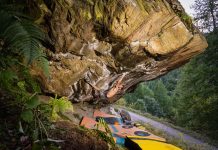?Britain?s countryside and footpaths remain open?, Gillian Merron the Cabinet minister for civil contingencies said yesterday. „A more measured response (than in 2001) is required,“ said Hilary Benn´s office. The government says it has, ?learnt the lessons of the experience of the 2001 outbreak and would not close down the countryside if it is not justified by the disease risk.? ?Current veterinary advice is that outside a protection zone, the risk of rights of way users and other visitors to the countryside spreading disease is low,? they said.“There is a clear balance to be struck between the need to control foot and mouth disease and the need to enable the public to have continued access to the countryside and rights of way for exercise, recreation and just getting from A to B. We also need to ensure that other important industries, such as tourism, are not unnecessarily affected by the FMD control measures,“ said a DEFRA spokesman, yesterday. However, DEFRA is still warning that its inspectors have the power to close public land and rights of way in the event of an outbreak.Restrictions on livestock movements were relaxed yesterday despite animals on a third farm showing symptoms of foot-and-mouth disease. Kevin Pearce, of the National Farmers? Union, welcomed the movements ruling: ?For a big chunk of the country, this is clearly a step forward.? The Anderson report into the 2001 outbreak concluded that, ?the side of caution-should be adopted more widely to ensure that any disease outbreak cannot develop into an epidemic. One of the most effective means of achieving this is to minimise animal movements at all times.? The report said that one of the causes of 2001 outbreak being so widespread is that there was a lot of movement of animals who were already incubating the disease. The government has also announced that it will help individuals and businesses who won?t be able to pay their taxes as a result of the outbreak.For further information see: www.defra.gov.uk www.bbc.co.uk/news
- Home
- News
- Videos
- Fotos
- Klettergebiete
- Unternehmen & Produkte
- Themen
- Themen beginnend mit 0-9
- Themen beginnend mit A
- Themen beginnend mit B
- Themen beginnend mit C
- Themen beginnend mit D
- Themen beginnend mit E
- Themen beginnend mit F
- Themen beginnend mit G
- Themen beginnend mit H
- Themen beginnend mit I
- Themen beginnend mit J
- Themen beginnend mit K
- Themen beginnend mit L
- Themen beginnend mit M
- Themen beginnend mit N
- Themen beginnend mit O
- Themen beginnend mit P
- Themen beginnend mit Q
- Themen beginnend mit R
- Themen beginnend mit S
- Themen beginnend mit T
- Themen beginnend mit U
- Themen beginnend mit V
- Themen beginnend mit W
- Themen beginnend mit X
- Themen beginnend mit Y
- Themen beginnend mit Z
- Routendatenbank
Climbing.de ist eine der ältesten deutschsprachigen Bergsportseiten im Internet.
Seit 1998 präsentiert Inhaber Martin Joisten, dessen Texte und Bilder in zahlreichen nationalen und internationalen Publikationen zu finden sind, aktuelle Informationen aus der Welt des Bergsports.
Seit 1998 präsentiert Inhaber Martin Joisten, dessen Texte und Bilder in zahlreichen nationalen und internationalen Publikationen zu finden sind, aktuelle Informationen aus der Welt des Bergsports.
Kontaktieren Sie uns: info@climbing.de
© Copyright 1998 - 2022 Climbing.de by Martin Joisten



![[VIDEO] Irmgard Braun: Record Breaking Rock Climber Who Gets Stronger Every Year Irmgard Braun: Record Breaking Rock Climber Who Gets Stronger Every Year (c) Hannah Morris Bouldering](https://www.climbing.de/wp-content/uploads/2025/11/youtube_MpAJEENfEjg-218x150.jpg)

![[VIDEO] The Challenge – Steve McClure The Challenge - Steve McClure (c) Petzl Sport](https://www.climbing.de/wp-content/uploads/2025/11/youtube_mfK9ynVsDvI-218x150.jpg)
![[VIDEO] Silence 9c/5.15d – The journey begins for Will Bosi Silence 9c/5.15d - The journey begins for Will Bosi (c) William Bosi](https://www.climbing.de/wp-content/uploads/2025/11/youtube_ujb7YRfE-7k-218x150.jpg)
![[VIDEO] Yosemite Crack Testpiece: Connor Herson on Magic Line Yosemite Crack Testpiece: Connor Herson on Magic Line (c) Fusis Films](https://www.climbing.de/wp-content/uploads/2025/10/youtube_h4GEt5iSZpA-218x150.jpg)
![[VIDEO] Hardest Trad Flash Ever | Adam Ondra | Lexicon E11 Hardest Trad Flash Ever | Adam Ondra | Lexicon E11 (c) Mammut](https://www.climbing.de/wp-content/uploads/2025/06/youtube_SAUyrDLG5xM-218x150.jpg)
![[VIDEO] Generations: Fred Nicole](https://www.climbing.de/wp-content/uploads/2014/12/youtube_NzeIvqQeGpc2-150x150.jpg)












